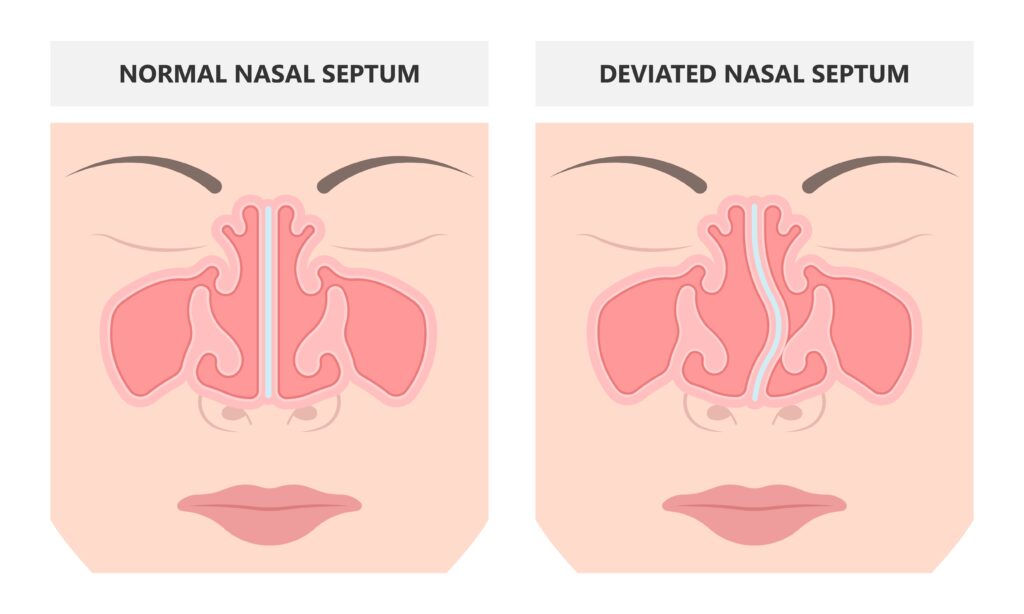
Your nose plays a critical role in helping you breathe. It’s divided right down the center by a thin wall called the septum.
Most people have a slightly uneven septum, which doesn’t cause any problems. But when the septum is drastically off-center, it can cause various health issues.
Keep reading to find out about 5 signs you could have a deviated septum and treatment options if you have one.
What is a Deviated Septum?

The septum is made of cartilage and bone and sits in the middle of your nose. A deviated septum means your septum is bent, making one nasal passage narrower than the other.
You can be born with a deviated septum or develop one after an accident or injury.
Common Signs of a Deviated Septum
A deviated septum can cause various symptoms. Here are some of the signs to look out for:
1. Difficulty Breathing
One of the most common signs of a severely deviated septum is trouble breathing through the nose. When one of your nasal passages is smaller than the other, it becomes difficult for air to pass through, and you may feel like one side of your nose is blocked.
Problems with breathing can be more apparent when you have a cold or allergies, which can make your nasal passages swell and narrow. You may also notice that breathing is more challenging while working out, jogging, playing tennis, or engaging in other physical activities.
2. Recurring Sinus Infections

A deviated septum can prevent your sinuses from draining effectively. Mucus can then build up, providing the prime environment for bacteria or viruses to thrive.
This can cause inflammation and recurring episodes of sinus infections. Additionally, the inflammation can lead to excessive mucus production, causing more congestion.
Patients with a deviated septum are more likely to develop recurring sinus infections because their sinuses cannot drain correctly.
3. Nosebleeds
Your nose has many tiny blood vessels, which help moisten and warm the air you breathe. However, the small, delicate vessels lie very close to the inner surface of your nose.
As a result, they’re easy to tear or rupture, resulting in bleeding. Bleeding occurs typically in one nostril, but it can also affect both nostrils.
With a misaligned or deviated septum, the extra air flowing in the larger nasal passage can dry out and crack the septum’s surface, causing a bloody nose.
4. Snoring
Sometimes, having a deviated septum from the midline of the nose can be quite severe, making it hard to breathe through your nose. Because your breathing is more impaired, you may compensate by breathing through your mouth.
When you breathe through your mouth, a lot of force is needed to push the inhaled air through the proper pathways so it can reach your lungs. As the air hits the back of your throat, it can cause the soft tissues to vibrate, leading to snoring.
Snoring with a deviated septum can frustrate anyone you may share a bed with, like a romantic partner. Breathing through your mouth while snoring can also cause a sore throat and other uncomfortable symptoms when you wake up.
5. Sleep Apnea
Sleep apnea is a sleep disorder where you stop and start breathing many times during sleep. Once you stop breathing, your brain jolts you awake so you can open your airway and begin breathing again.
These episodes can continue hundreds of times throughout the night. Obstructive sleep apnea (OSA) is the most common type of sleep apnea.
It happens when your throat muscles relax and block your airway. A deviated septum doesn’t cause sleep apnea, but it can worsen it.
When your septum is bent, one side of your nostril is partially blocked, making it difficult to get enough oxygen when breathing through your nose. Having a blocked nostril can increase the number of sleep apnea episodes and exacerbate sleep apnea symptoms.
How is a Deviated Septum Treated?
There are different treatment options for a deviated septum, including:
Medication
If you have a minor deviated septum, you may be able to manage these symptoms with medication. Your Indianapolis Sinus Center ENT specialist may recommend an over-the-counter decongestant or nasal rinse to clear your nasal passages and help you breathe more easily.
If you have more severe congestion, they can prescribe a corticosteroid spray. Although these medications may ease your symptoms, they can’t permanently correct a deviated septum.
Septoplasty
If you have a badly deviated septum that is affecting your quality of life and medication doesn’t provide relief, your ENT specialist may recommend a septoplasty. A septoplasty is a surgical procedure that permanently straightens a deviated septum.
The procedure is customized to remove obstructions, improve breathing, and address other concerns associated with your deviated septum. During the procedure, your ENT specialist can trim, reposition, and possibly replace bone, cartilage, or both.
A septoplasty is sometimes combined with a rhinoplasty, a procedure that enhances and improves the appearance of the nose.
Breathe Easier

A deviated septum could be the reason for your recent health problems, especially if you’re finding it more challenging to breathe. If you struggle to breathe because of a deviated septum, the team of experienced ENT specialists at Indianapolis Sinus Center can help.
We have effective solutions to help you find long-lasting relief and regain control of your breathing. Are you ready to breathe better? Schedule your appointment at Indianapolis Sinus Center in Greenwood, IN, today. Why wait to feel and breathe better?


